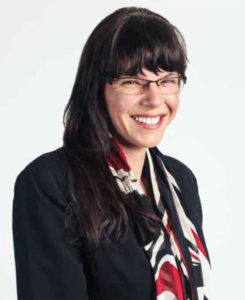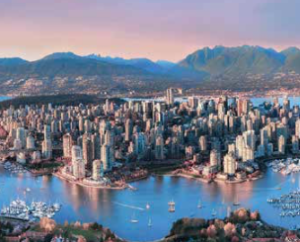Face to Face: Andrea Reimer
Councillor of Vancouver City
 Tell us about your current role as Councillor in the Vancouver City Council.
Tell us about your current role as Councillor in the Vancouver City Council.
I was first elected to city council in 2008 and then re-elected in 2011 and 2014. We are elected to serve the whole city of Vancouver so we have the whole city to think about in our work. And we also get portfolios (projects) from the mayor’s office if we’re in the majority party. So I have quite portfolios but the three that might be most interesting would be – greenest city, renewable energy, and energy generally, and economic development and innovation economy (i.e. digital technology, clean technology).
What made you get interested in working on environmental issues?
that’s a really long story. the broad thing I would say is that originally I was much more interested in social issues and making sure people, particular people who lived on low incomes or who didn’t have, access to the kind of resources that other people have, had access to housing, education, transportation, and jobs.
But the more I worked on those issues, the more that I saw that people living in environments that were impoverished couldn’t protect themselves from environmental degradation and that the more there was a divide between the rich and poor, the worse the impacts on the environment and faster the people who were poor had worse and worse outcomes for their families. So I decided it was important for me to think about the people but also about the environment they were in.
 Could you tell us more about the greenest city action plan? How is it helping the city of Vancouver?
Could you tell us more about the greenest city action plan? How is it helping the city of Vancouver?
The greenest city action plan came out of one of 4 big goals we committed to when we were first elected in 2008. At that time the commitment was to be the greenest city in the world by the year 2020. So it was a huge commitment to make. And Vancouver and Canadians generally don’t have a culture of making big commitments. So at the time, it was a very new kind of concept.
By beginning February 2009 the greenest city action team was established, along with a framework that said that we wanted them to come out with metrics in 10 key areas. It was important for us to be able to see the goals we had to get to for the public to be able to track our progress and for us to be accountable to the goals. So they set 17 metrics in those areas.
From there we went to the public, shared these goals and asked them how we could towards achieving them. We brought in academics, business groups, labour unions, faith communities, youth groups, seniors groups, every- body and anybody who wanted to participate. Because the only way it was going to be successful was if people had bought into the ‘how’ of the plan as they were going to be involved in that.
the greenest city action plan has brought about massive positive change. there is a positive change on the actions (i.e. Active transportation has increased so now more than half of Vancouver rides, walks, cycles or takes transit every day). And that has positively impacted the environment – lower GHG, less waste, lower water usage and more food assets. And we also see a positive social impact. People are walking more or they are urban farming, so they end up spending more time with each other, connecting and learning more about each other. Communities are breaking social barriers and becoming closer.
And the other way it has helped the city is by changing our perspective. We now see that we can have this big goal and everyone can work together to achieve this shared aspiration. And that has impacts in not just in greening Vancouver, but other big goals as well.
Vancouver is on its way to being the greenest city in the world. What does being the ‘greenest city’ mean to you?
Our vision of the greenest city has been translated to the 10 environmental policy areas that we have set. these include climate, buildings, transportation, access to nature, green jobs, availability of local food, clean water, and etcetera. We really wanted to make sure a green city was not just about the climate, because of the climate definitely important but that’s not the only thing.
Tell us something about Vision Vancouver.
In Vancouver, we have to run for the entire city because we don’t have smaller wards, so people tend to work together across political parties. the city level political parties are different from political parties that are at the national or state level. In fact its not considered positive to have the same party at all levels because cities have often different interests than the provincial and federal governments and you need to be able to advocate to the provincial/ federal government for your needs without feeling like your hampered by members of your party and people feeling bad about your advocacy.
vision Vancouver is a local civic political party in Vancouver. All of our members and us are excited about cities and are excited to have Mayor Gregor Robertson, me and our team, who are very focused on how Vancouver can be a globally significant and competitive city.
What are the lessons other cities can learn from Vancouver?
Look at the actions we have taken – set- ting up the 10 policy areas, 17 metrics and 100s of initiatives to meet these metrics. Each of those can have a different lesson for other cities. Not all of these lessons are transferable because it is a
lot about context. So for example, the way we have reduced the number of cars in Vancouver is very specific to our built form and culture. you can’t necessarily take those lessons to a city like Houston or Paris because they are such different cities in terms of both the culture and urban planning. However, transferable lessons would be how we got people to go from putting all the waste in one bin to diverting their waste (recycling). vancouver is now almost at 70% diversion.
The process is the most important lesson to take away. the process has four critical ingredients:
- A leader (i.e. Mayor) – to show that they are fully invested in the goal and their success can be judged based on this.
- Having a plan – with clear targets and metrics that the public can hold you accountable to, and for the whole organization to understand what they are working towards. ‘Some is not a number, soon is not a time’ – a philosophy that helps any government to ensure they have clear metrics and clear timelines for reaching them.
- Action – be prepared to act even if it means failing because failing is important to demonstrate to yourself that you are pushing the edges on what you are trying to do and to also learn. Many cities have leaders and plans but they don’t necessarily have action.
- Partnership – to work together to achieve the goals. We have over 200 institutional partners, thousands of individual partnerships to meet our goals.
Is it difficult to balance economic progress and sustainability in city planning?
Not at all. there has been a huge impact on our economy from our greenest city initiative and all of it has been positive. Despite the rest of Canada’s economy slowing down because of its over reliance on non-green industries, particularly oil and gas, Vancouver’s economy is moving at rates that is similar to other countries in the developing world that have very high growth economies and that’s all based on green jobs and the concept of a clean green economy.
However, there are still the challenges of transitioning industries within the economy.
For example the people in the waste industry see a shift in job scope. With waste diversion, the industry has become more labour intensive than the previous material recovery. So there some impacts to the system that you have to plan for and we have an economic commission who’s jobs is both to plan for that and ensure as much as possible it is a positive transition.
Do you have any advice for industry students and building users?
Everything I’ve said so far. Have leaders leading to be a leader but also demand/ ensure the leaders you have are showing leadership positions on issues. Planning is huge but what should be in the plan? Set the boldest goal you can. think of a goal
that is big, bold, exciting and aspirational that you can pull people into. Because once you have that framework, your actions will be bigger than your expectations. It is more than just wanting to be something better. Doing better is important but being the best is something that humans can rally behind.
In terms of students and building users, you’d be surprised how significant action is. So just act because once you do you’ll be amazed at how much you can ripple through the people and institutions around you to create change.






